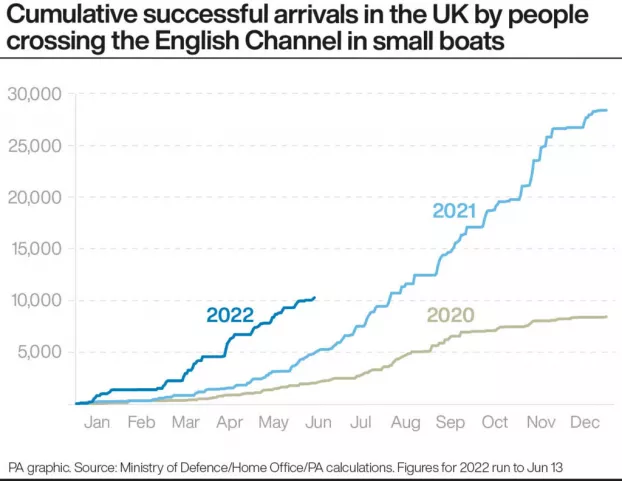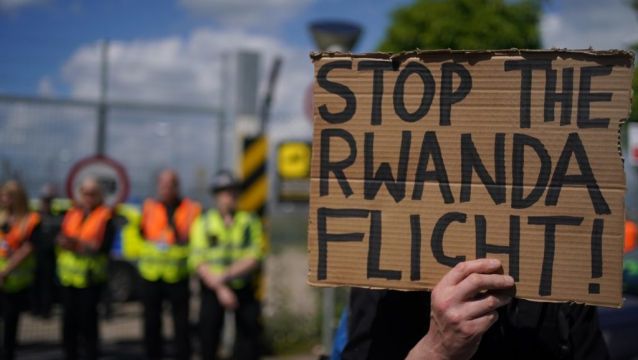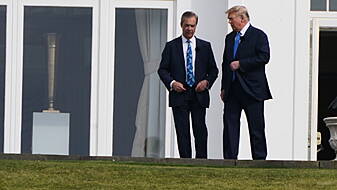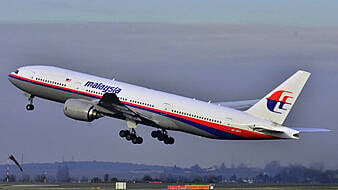After multiple legal challenges and widespread condemnation, the UK's plan to send migrants to Rwanda will soon take shape as the first flight of asylum seekers is due to leave for the African nation on Tuesday evening.
Although British prime minister Boris Johnson and some of his senior cabinet members have hailed the new approach as the best option, people from across the political divide, and even a member of the British royal family, have spoken against the Rwanda plan.
Here's everything you need to know about the UK's plans to tackle illegal immigration and the controversy to date...

What led the UK to take action?
The new policy aims to reduce the number of people crossing the Channel to the south coast of England from mainland Europe.
Each year, thousands of people wishing to seek refuge in the UK opt to cross the Channel by whatever means possible, often in small, overloaded boats which are unsuitable for the journey.
According to figures from the PA news agency, almost 30,000 asylum seekers arrived in the UK in 2021. At least 44 people, including three children, are known to have died or disappeared while attempting to make the crossing last year.
Twenty-seven of those deaths occurred on November 24th last year, the largest single loss of life on record on account of a Channel-crossing, prompting calls for more to be done to avoid migrants choosing to attempt the journey.
The UK government is hoping the new policy to clamp down on refugees coming by boat will act as a deterrent, reducing the number of people turning to people smugglers to make the dangerous journey across the Channel.
What do they plan to do?
The policy will see the UK transfer migrants to Rwanda as part of a five-year deal between the two countries, with an option to renew the scheme one year from its end date.
Asylum seekers arriving in Dover in the south of England will be brought ashore by British Navy and Border Force personnel, where they will be medically assessed before being taken to the nearby Manston airfield which will be used as a processing site.
Anyone deemed to have entered the UK by dangerous or illegal means will be detained and considered for removal to Rwanda. The UK government said a screening process will exempt people with relevant vulnerabilities or safeguarding risks from being sent to Rwanda.

Those selected for deportation will be sent to Rwanda on a chartered flight. Whilst there, they will be housed in temporary accommodation while their asylum applications for Rwanda are assessed.
The cost of sending these people to Rwanda and their living expenses while there will be covered by the UK government, or the UK taxpayer to be precise. Although the deal involves a £120 million (€138 million) payment from the UK to an "economic transformation and integration fund", ministers have not revealed how much the scheme will cost.
Although the exact sum will likely be dependent on the number of people sent to Rwanda, the Refugee Council has claimed it could soar to £1.4 billion (€1.6 billion).
Why Rwanda?
This is not Rwanda's first such deal, with commentators questioning whether the country's willingness to accept asylum seekers is driven by money, improving its perception internationally, or forming closer ties with other countries.
Despite Rwanda's willingness, there have been concerns raised as to the country's safety, with critics highlighting its "dismissal" of human rights in the past.
Disputing these concerns, Mr Johnson described Rwanda as one of the safest countries in the world, with the British home secretary Priti Patel adding it is a "safe and secure country with the respect for the rule of law".
Rwanda is a safe country and has previously been recognised for providing a safe haven for refugees – we will continue preparations for the first flight to Rwanda, alongside the range of other measures intended to reduce small boat crossings.
3/3— Priti Patel (@pritipatel) June 10, 2022
While the travel advice page for Rwanda on the UK's Foreign Office website describes the country as "generally safe", it notes that homosexuality "remains frowned upon by many", prompting concerns that LGBT people would not be safe there if they were deported from the UK.
The High Court in England also heard that the UN refugee agency, the UNHCR, has multiple concerns about the system in Rwanda, including discriminatory access to asylum, a lack of legal representation and other “deep-rooted structural problems”.
Has this been done before?
Back in April, Denmark also began talks with Rwanda to establish a similar arrangement, making it the first EU country to attempt a breakaway from the bloc's approach to migration and asylum.
The move came a year after an earlier attempt to allow refugees to be sent from Denmark to asylum centres in a partner country, however, this never materialised as no such partner country was found.
Further afield, Australia has had a similar system in place since 2001, sending asylum seekers to Papua New Guinea and the Republic of Nauru. While the Supreme Court in Papua New Guinea has since found the refugee centres to be "illegal", the arrangement remains in place in Nauru, and a three-year deal between Australia and New Zealand was also announced earlier this year.
Is there support for the plan?
Since the UK government announced the plans, there has been considerable kickback from opposition parties, human rights groups and the public.
On Monday, hundreds of protesters took part in a demonstration outside the Home Office in London calling for the Rwanda plan to be scrapped.

The protest followed a number of legal challenges aimed at blocking the flights from going ahead.
Meanwhile, leaders of the Church of England described it as an "immoral policy" which "shames Britain".
However, the most significant alleged critique came from Britain's Prince Charles, due to the royal family's long-held custom of avoiding political commentary.
It was reported last week that the prince privately described the policy as "appalling", adding that he is "more than disappointed" with the UK government's decision to press ahead with the plan.







